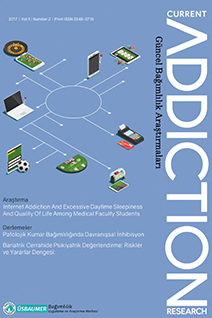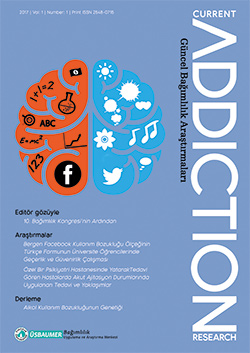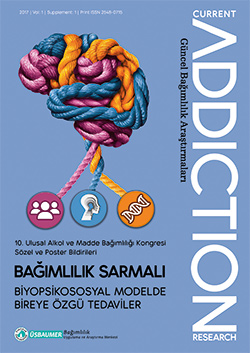Years
2023
Categories
Authors
ARTICLES
Original Article
Ceren GÜNGÖR,Cemal Onur NOYAN
2023, 7(2), s:13-18
Objective: This study was designed to investigate the relationship between family involvement, stigmatization, perceived social support, and treatment motivation in drug addiction treatment.
Method: The participants of our study consisted of individuals receiving substance use disorder treatment at the NP Brain Hospital AMATEM service and the Green Crescent Counseling Center (YEDAM). The research included a total of 98 voluntary participants, including 88 males and 10 females, aged 18 and above, receiving substance use disorder treatment. Among the participants, 57 had family involvement in the treatment, while the remaining 41 did not have their families involved in the treatment process. Data were collected using the Personal Information Form, the YEDAM Substance Addiction Stigmatization Scale (YMBSÖ), the Multidimensional Perceived Social Support Scale (ÇBADÖ), and the Treatment Motivation Questionnaire (TMA).
Results: When the results were evaluated, a significant relationship was found between the family subscale of perceived social support and the treatment confidence subscale of the treatment motivation questionnaire. Among the subscales of the Treatment Motivation Questionnaire, the score for seeking interpersonal help was higher in patients whose families were involved in the treatment. When the stigma scores of participants living alone were compared with those living with their families, it was concluded that individuals living alone had higher stigma scores.
Conclusion: The findings from our study have shown that substance addiction negatively affects many essential aspects of patients' lives, such as their social relationships, family and environmental connections, as well as their work and academic lives. Substance addiction, which is becoming an increasingly significant societal issue, requires a multidisciplinary approach that involves not only medical treatment but also the involvement of families and society in order to regulate individuals' social lives, education and work lives, and family and environmental relationships.



 2. Sayı
2. Sayı
 1. Sayı
1. Sayı
 Ek Sayı
Ek Sayı







